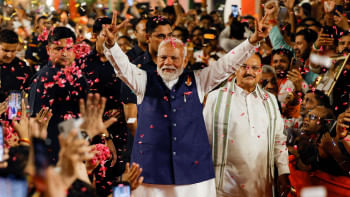Lessons from four elections: More challenges to democracy ahead

In the year of elections, four recent elections have sent some messages which deserve our attention, particularly considering that we are living at a time when democracy is under threat globally and extremism is on the rise. These apparently disparate elections and their results seem to have some common elements with lessons for liberal democratic forces around the world. The elections I am referring to are the Indian election, the European Parliament election, the UK election, and the election in France. Held between April 19 and July 7, these elections were closely observed for several reasons. And there have been arguments that these may serve as barometers to the future of democracy.
India's election, with the largest number of voters in the world, and with the widespread prediction that Narendra Modi's Bhartiya Janata Party (BJP) will continue in power with a larger number of parliamentary seats this time around, ended up with a result which put a brake on Modi's authoritarian tendencies. Defying predictions by pollsters, the opposition alliance INDIA, led by the Indian National Congress, emerged as a formidable opposition after a decade, and BJP failed to secure an absolute majority.
The past decade witnessed a serious erosion of democracy in India. There were and still are concerns about what path the country will take under Modi's third term. The European Parliament election, held between June 6-9, was a gigantic endeavour because of the number of countries involved—27, to be precise. With the growing appeal of rightwing populism in Europe, the question was: will the far-right eclipse the centrists and shape the future trend in Europe?
The British election, held on July 4, delivered a shift of power after 14 years from the Conservative Party to the Labour Party, as anticipated. But the results revealed a few disturbing trends. Parliamentary elections in France were held in two rounds, on June 30 and July 7, but were not anticipated to happen so soon before June 9. The early election was a consequence of the dismal electoral performance of President Emmanuel Macron's party in the European Parliament election. In a sense, it was a gamble by Macron, which turned out to be more high-stake than Macron and the French people had anticipated. The elections almost brought the rightwing National Rally (NR) to the gates of power, only to be pushed away by the left alliance—New Popular Front (NPF)—which came into existence only after the first round of voting.
The results of elections in India, France, and Britain demonstrate that voters are unhappy with the incumbents, but most importantly, their economic policies. It is not surprising that elections put incumbents in a difficult spot; elections are often considered as referendum on the incumbents, as they must defend their records. But in these instances, including in part in the Iranian election, it was beyond anti-incumbency.
While economy is not the only reason for unseating the Conservatives in Britain, there are other factors such as the dismal state of the National Health Service (NHS). Nevertheless, the bread-and-butter issue was the driving force. In India, unemployment, falling incomes, and inflation coupled with farmers' discontent became the hurdles which Modi and his party failed to cross. France's debt situation has been a matter of concern for all in the Eurozone, while dissatisfaction has been growing among French citizens. The lesson is clear: "it is the economy, stupid."
The shock victory of France's left alliance has allowed many across Europe to heave a sigh of relief. The victory of the Labour Party in Britain, although predicted ahead of the election, in some measures have engendered similar reactions. The Indian election result gives hope that the downward spiral is stopped, at least for now. These are the results that can be read as rejection of anti-pluralist extremist politics. But a closer look at it shows that the right-wing extremist forces are far from being defeated.
In India, it is still the BJP and Modi in power, and there is no reason to believe that the pernicious politics of division will be shunned. It has taken root in society, and cannot be ignored. In Britain, Labour has secured an historic win, but its support has remained almost the same as 2019, and an almost 20 percent swing from Conservatives did not go to Labour or LibDem, but to the extreme right wing Reform UK party. The Reform UK party has secured more than 14 percent of the popular vote, and has placed itself as the third largest party ahead of the LibDem.
In France, even after the left parties came together and reached an understanding with the centrist parties, the vote share of the NR and its allies stood at 37.6 percent. These figures echo the results of the European Parliament elections, which saw a surge of rightwing parties in Germany, France, Italy, and Austria. Although the European Parliament has limited power for domestic issues, the rise of the rightwing parties was not a complete surprise. Indeed, one can take comfort in the fact that despite rightwing parties performing well, the centre-right and centre-left groupings have retained their dominance in the European Parliament. But what will happen in the future if the present trend continues is an open question. If there is a lesson, it is that the danger to liberal democracy is not over. Instead, the coming years will be more challenging.
Do these elections indicate a strategy to beat populist politics? In India, unlike the past two occasions, Modi's populist rhetoric did not work as the opposition made the election a choice of policy more than of personality. France's election, at least in the first round, sends a different message—populism works. The same is the message from the rise of the Reform UK party. In the European Parliament elections, the right-wing parties which did well are known for their populist rhetoric. Some analysts, for example, Max Boot in the Washington Post, suggest that centrist politics is the antidote to populism. He refers to the policy shift of the Labour Party under Keir Starmer vis-à-vis Jeremy Corbyn as an example. Undoubtedly, Starmer has moved the party to the centre, but there has been a price for that too. The Labour Party has secured less popular votes than in 2019.
The argument that moderation and centrism is the way to go does not resonate with the French election results, as the Left alliance has some parties which have somewhat left-extremist positions. The voters have not rejected them. As such, these elections have not made any serious dent to populist politics.
There is a need for soul searching as to how to address the rising appeal of populist demagogues. In the United States, Trump is the personification of such pernicious populist politics. His appeal to the voters has not subsided; instead, with less than five months to go before the election, he is ahead of his opponent Joe Biden.
Both the Indian and French elections demonstrated that in the face of grave threats from undemocratic political forces, it is imperative to close the ranks and build an alliance. The opposition alliance INDIA is a bloc of disparate parties, but their decision to stand together to challenge the Modi regime provided an alternative to Indian voters. Similarly, the NPF in France is not a cohesive alliance. In fact, the partners were engaged in rhetorical battle until the first round of the election. Whether they can work together and work with centrist parties will be tested in the coming days. But for the moment, one must acknowledge, the left has played an historic role.
Ali Riaz is distinguished professor of political science at Illinois State University, US and a non-resident senior fellow of the Atlantic Council. His recent publications are "Pathways of Autocratization: The Tumultuous Journey of Bangladeshi Politics" (Routledge, 2024) and "The Charade: Bangladesh's 2024 Election (Prothoma, 2024)."
Views expressed in this article are the author's own.
We welcome your contributions and analysis of global events, and responses to our articles. To submit articles to Geopolitical Insights, please send an email to [email protected].
Follow The Daily Star Opinion on Facebook for the latest opinions, commentaries and analyses by experts and professionals. To contribute your article or letter to The Daily Star Opinion, see our guidelines for submission.

 For all latest news, follow The Daily Star's Google News channel.
For all latest news, follow The Daily Star's Google News channel. 











Comments